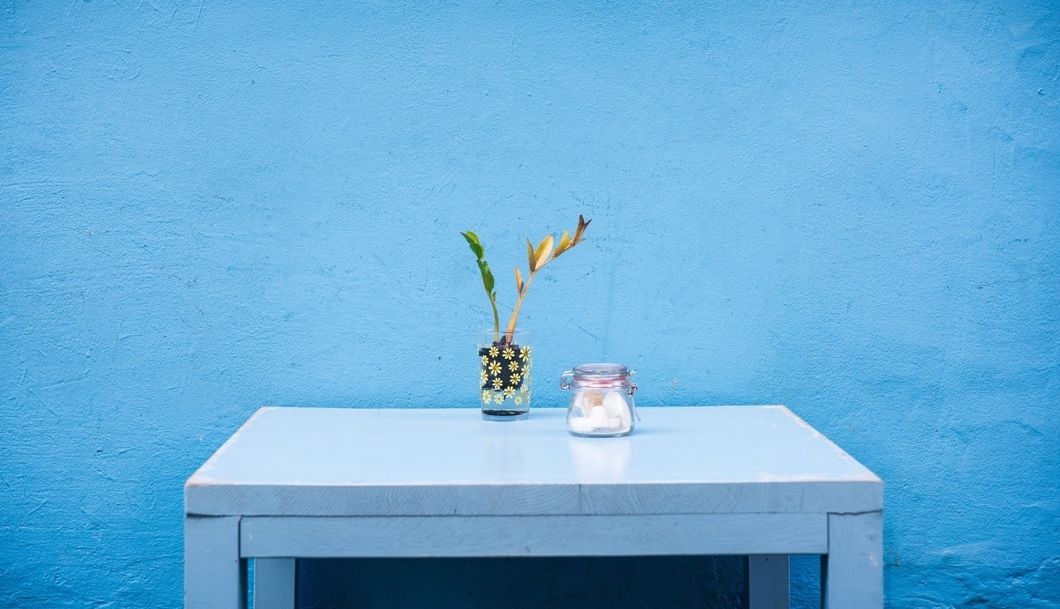My bedroom at home used to be littered with sentimental knick-knacks and clothing from sixth grade that I convinced myself I might wear again someday. I let the clutter grow throughout my life to remind myself of all the wonderful people I had in my life and all my happy experiences; my room was a safe place doused in nostalgia. I hid there for most of my freshman year in high school trying to thwart off panic attacks and anxiety.
It never occurred to me that the clutter itself was a form of compensation until I was cleaning my room one day and found my old journal stuffed with birthday letters dating years back. Some of them were from people I barely knew, some were letters from relatives with a quick "happy birthday" scrawled under the card's greeting like "special wishes on this special day". These cards held sentimental value and as I found myself looking through them I longed for the people and not the object. Sometimes, holding onto something as a reminder of a person serves to justify the distancing of yourself from them.
This is when I started throwing everything away. I refused to place value on objects that do not deserve to be valued like crayons from a restaurant I went to in New York or a charger cord from my old flip phone. I purged my room of old clothes, knick-knacks, and miscellaneous objects. I even threw away the birthday cards, instead choosing to call my aunt, my grandma, and text my best friend. The value of these connections is not in a birthday card they gave me three years ago but a continuing effort to be a part of each other's lives.
Days after, when five big grocery bags of stuff had been hauled out of my room I felt renewed. I will always suffer from anxiety, but detoxing the unnecessary out of my life allowed my safe place to become more opening and welcoming. It helped me to place my value in the present and by decluttering my room it felt as if my thoughts had become less overwhelmed with anxieties too.
The transition to college was scary especially since the people I would be surrounded by would not know about my anxieties, how they manifest, and how I compensate. I barely brought anything with me: a couple small plants, seven t-shirts, two sweatshirts, a mug my best friend gave me, and a necklace from my dad (along with other necessities). The simplicity of my room allows me to focus on what should be valued and does not permit unnecessary objects to make my room and mental space feel smaller and stuck in the past.
By becoming a minimalist I have become a conscious consumer (What do I need? What do I want? What will happen if I do not buy it?) and in this sense, I have become more involved in the present and future. My anxieties still manifest, in no way is this a cure, but it definitely helped me consider what is actually important in life and stopped my brain from replaying the never-ending possibilities of "what if?" because in reality "what if" is a question that is usually asked too late. Minimalism has allowed me to focus on the present and future helping me to concentrate on bettering myself by looking forward instead of backward.





 Lumiere figure at the Disney Store at the Ala Moana Shoppi… | Flickr
Lumiere figure at the Disney Store at the Ala Moana Shoppi… | Flickr








 StableDiffusion
StableDiffusion StableDiffusion
StableDiffusion 10. Extra BlanketsJuwenin Home 100% Cotton Knitted Throw Blanket
10. Extra BlanketsJuwenin Home 100% Cotton Knitted Throw Blanket StableDiffusion
StableDiffusion StableDiffusion
StableDiffusion File:Kishlaru familie.jpg - Wikimedia Commons
File:Kishlaru familie.jpg - Wikimedia Commons Photo by Hanna Balan on Unsplash
Photo by Hanna Balan on Unsplash StableDiffusion
StableDiffusion black blue and yellow round illustrationPhoto by
black blue and yellow round illustrationPhoto by 





 woman holding glass jar
Photo by
woman holding glass jar
Photo by 






